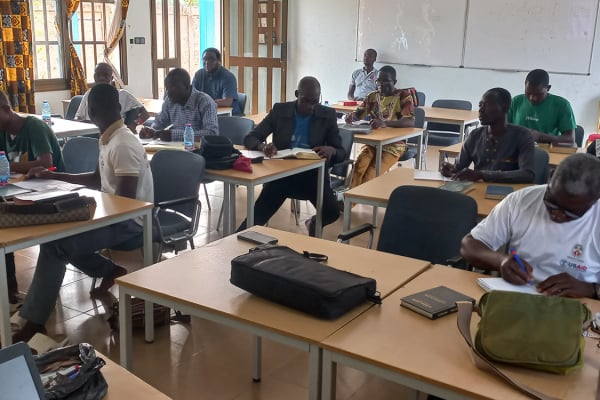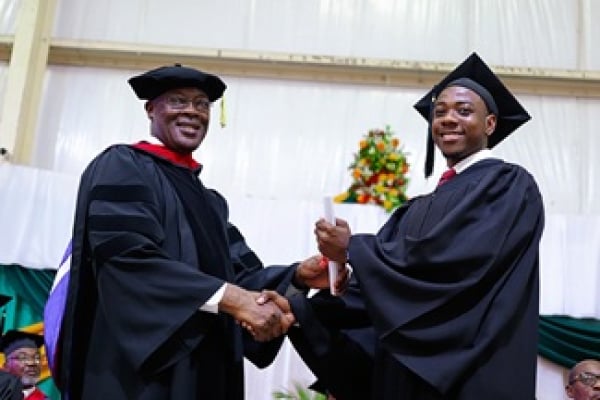
What degree do you need to be a missionary?
I was sitting in a coffeeshop when a college student I recognized walked in the door. She approached me and, without introduction, exclaimed, “I cannot wait to walk the streets of [closed country] and share the gospel with the unreached.”
Now, I’m a missions coach and I’m thrilled when someone wants to live and work among the unreached. But I wondered how much thought she’d given to her plan for reaching such a difficult country. You can’t waltz in and share the gospel on the streets, I thought to myself. At least not if you plan to stay in the country, or even alive. But I decided to hold that comment for later.
Instead I asked two simple questions: “How do you plan to get a visa? And what kind of preparation have you had?”
To the first, she responded, “What do you mean?” And to the second, “I’m getting a Bible degree.”
I often hear responses like these from well-meaning Christians who have held a life-long dream of being a missionary. Unfortunately, the world has changed and many of the remaining unreached countries don’t allow you to simply “walk the streets and share the gospel.”

 Considering missions? Download our free guide, “Am I Called to Missions?” to help you discern God's leading.
Considering missions? Download our free guide, “Am I Called to Missions?” to help you discern God's leading.
If you’re in college and planning to become a missionary after you graduate, consider this: 67 percent of the world’s population live in the 10/40 Window where it’s not usually possible to get a missionary visa.
So what does that mean for your education? A Bible or missions degree might still be the right choice. Or it might not. Let’s step back and ask some bigger questions before you choose your major.
Do you need a degree to become a missionary?
First question: Do you need a degree at all? Some missions agencies require a bachelor’s degree for full-time service, while others do not. Some roles on the mission field require specific education, like seminary training for planting a church, while others like teaching English or counseling sometimes need only a certificate, and still others require no formal training at all. If you start with a missions internship, you might find you can learn what you need through on-the-ground experience with seasoned missionary mentors.
If you know what you’re interested in doing, talk to a missions coach about what’s required for that specific organization and role.

A missions degree from a Christian college or seminary is good preparation for missions, but it’s not on the only path to biblical training.
Is a missions or seminary degree the only path to choose?
A Bible or missions degree from a Christian college or seminary is good training for missions. You’ll learn to study the Bible, teach others, and apply Scripture across cultures — all skills you’ll need on the mission field. And if you want to pursue a formal ministry role like planting a church or serving as a pastor, you’ll need higher education in theology, biblical studies, or cross-cultural ministry.
But it’s certainly not the only path and, in some cases, might not even be the best path. Think, for example, about applying for a visa to a least-reached country that’s hostile to the gospel. Will the authorities look favorably on your application if they see a Christian seminary on your resume?
If a closed country is in your future, you might want to rethink a formal degree and consider other ways to get the essential Bible training you need, such as a Bible certificate or online courses tailored to your interests. A missions coach can help you evaluate options and choose the best one for your future.
What are alternate degree options for missionaries?
You might think of all missionaries as being pastors or outreach workers, but missionaries come in all shapes and sizes. The purpose of missions is to make disciples, and you can do that through any career! That throws the door wide open for alternate education and career paths.
While 67 percent of the world’s population live in places where you can’t get a missionary visa, those same countries welcome professional skills that bring value to their community. You can get a visa to be a dentist, IT specialist, teacher, sports coach, social worker, or business consultant just about anywhere!
Pursuing something other than a Bible degree doesn’t make you less passionate about reaching the nations, and it won’t hinder you from an effective cross-cultural ministry. It may even help — help you get access to least-reached countries, help you build relationships with people in other sectors of society, and help you bring God’s love to every area of life.
You would do yourself service to pursue a marketable skill you can take anywhere in the world. And if you pair that with even informal Bible training, you’ll be poised to make an impact doing marketplace missions.

You might be surprised how a hobby can be turned into a career on the mission field.
How to choose a college major or career path
Now that you have lots of options, which direction should you choose? Should you stick to the missions degree path or pursue a universally marketable skill?
Here are three suggestions to help you answer those questions.
- Explore your own interests.
What areas of study are you most passionate about? Do you geek out over the original languages of Scripture? Do you feel most useful when helping someone find the right diagnosis or medication? Are you a born businessman? Whatever God has placed on your heart might be the very thing he wants you to use for his glory. You might be surprised how a hobby (like American football) can be turned into a career on the mission field.
If you’re not sure what you’d be good at, ask your friends and family or take a career quiz. Try shadowing people in different professions to see what an average day is like. Most of all, pray for God to show you how he’s wired you. - Research the country you want to serve in.
What kinds of visas do they offer? Would a Bible or missions degree help or hurt you? What types of work are missionaries engaged in there? What are the needs in the local community? For example, you may find that local schools are hiring native English speakers to teach English. You could major in Teaching English as a Foreign Language. Or if you’ve already graduated, you could pursue a TESOL certification.
It’s great to have a location of interest, but try to keep an open mind. God may have a place for you that isn’t even on your radar yet — if you’re willing to follow his leading. - Talk to missionaries or a missions coach.
No one knows the situation better than the people who are living it. If you know a missionary, ask them about their experience picking a major and how they chose their ministry. Ask them about opportunities that already exist in their area or ones they’re looking to start.
If you don’t know any missionaries, a missions coach can give you a broad picture of opportunities around the world and what location or ministry might fit your interests. They can guide you about how a particular degree path will affect your choices for overseas service in the future.
As you consider your future in missions, it’s important to start thinking ahead of time what education will be most helpful overseas. But don’t let this decision paralyze you from moving forward; remember that there’s no wrong way to serve. No matter what degree or career path you choose, you can be a disciple-maker wherever you are.
If you’re planning for a future in missions and want some guidance, talk to a Crossworld missions coach.
 Mark Silvers served with Crossworld in the Philippines for 10 years and joined the Recruitment team in 2009. Mark’s driving passion is to reach the 3.4 billion people in the world today with no access to the gospel.
Mark Silvers served with Crossworld in the Philippines for 10 years and joined the Recruitment team in 2009. Mark’s driving passion is to reach the 3.4 billion people in the world today with no access to the gospel.

 Considering missions? Download our free guide, “Am I Called to Missions?” to help you discern God's leading.
Considering missions? Download our free guide, “Am I Called to Missions?” to help you discern God's leading..png)

 By Mark Silvers
By Mark Silvers











